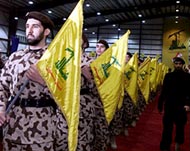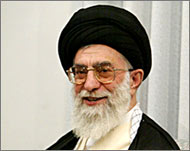Lebanon weeps for its fallen fighters
After the joy over Israel’s release of more than 20 Lebanese prisoners, a day of sadness has followed with the return of the bodies of 59 fighters killed during the Israeli occupation.

The Red Cross handed over to Lebanese authorities and the Hizb Allah movement the bodies of the anti-Israeli fighters, mostly Lebanese, for a sombre ceremony on Friday near the Naqura border post, after their return from Israel.
The body of another unidentified Lebanese who had died in Israel was also handed over, said Nabil Qauk, the top official in south Lebanon of the resistance group Hizb Allah.
The coffins arrived at 9:00 am (07:00 GMT) aboard trucks belonging to the International Committee of the Red Cross.
Draped in flags
Members of the Hizb Allah draped each coffin in a Lebanese flag and placed flowers on top, before loading them on to three open-top trucks framed with plexiglas.
Preceded by Hizb Allah ambulances, the trucks drove slowly along the several hundred metres to a reviewing stand by the seaside to be received by Lebanese government officials, Hizb Allah number two Naim Qasim and a representative of the Iranian government, Ali Akbar Mohtashamipour.
There a Lebanese army band played the national anthem and a funeral march. From the review stand, an Israeli patrol boat was clearly visible off the Lebanese coast for the second straight day.
After the ceremonies, the bodies were being taken north along the coast road to Beirut, where they were to be examined by pathologists before burial on Saturday.
“The fatherland is victorious,” and “Welcome back to the fatherland,” read banners erected along the road.
Silent homage
 |
|
The released prisoners have |
In the coastal towns of Tyre and Sidon as well as villages on the route, schools and shops were shut as residents lined roads to pay a silent homage to the fallen fighters, in sharp contrast to jubilant scenes on Thursday in Beirut.
The bodies of the fighters, killed during the Jewish state’s two-decade-long occupation of southern Lebanon that ended in May 2000, were handed over by Israel on Thursday to the Red Cross.
However, Hizb Allah chose to delay their transfer so as not to coincide with festivities over Israel’s release the same day of prisoners who were given a hero’s return to Beirut.
The return of the bodies was part of a broader agreement under which Israel freed 400 Palestinian and 31 other prisoners, 23 of them Lebanese, in exchange for a captured Israel bussinesman and the bodies of three Israeli soldiers killed in October 2000.
Ceremony
In the mainly Shia southern suburbs of Beirut, festooned in the yellow flags of Hizb Allah, a ceremony was being organised to honour the fighters before their burials.
Apart from Hizb Allah members, the group of 59 bodies returned by Israel also included those of members of other Lebanese and Palestinian groups which fought the occupation.
The 21 Lebanese freed by Israel stepped off a German military plane into freedom and to a hero’s welcome at Beirut airport late on Thursday.
Iran’s welcome
 |
|
Ayat Allaj Khameni believes the |
Commenting on the historical swap was Iran’s supreme leader Ayat Allah Ali Khamenei who on Friday welcomed the exchange as a sign that the “Zionist regime is defeatable”.
“I congratulate you and the Hizb Allah Mujahedeen, the people of Lebanon, especially the families of the prisoners, and the Palestinian people for the release of hundreds of sons of Islam from the prisons of the oppressor Zionist regime,” Khamenei said in letter to Hizb Allah Secretary General Sheikh Hasan Nasr Allah.
“This is yet another movement showing that the evil Zionist regime is defeatable by the strong wills and concrete faiths of the Mujahedeen of Islam, and I hope that the rest of the prisoners would be freed.”
Meanwhile, Iranian President Muhammad Khatami was reported as saying he hopes the “remaining prisoners who are kept in the Zionist’s regime prisons will be freed as soon as possible.”
In his remarks, during a telephone conversation with Lebanese counterpart Emile Lahud reported by state media, Khatami also thanked the Lebanese government for following the fate of four Iranian diplomats who disappeared during Israel’s invasion of Lebanon in 1982.